|
|
Short
Table of Contents
|
Click on the chapter you want. |
|
 |
A.
GETTING STARTED
1.
About
This
Site
2.
Process
&
Focus
3.
How to Think & Read in College
4.
Literature, Reading, &
Writing |
BIG problem? |
|
 |
B.
UNITS OF ENGLISH
5. Choosing Words
6. Making Sentences
7. Organizing and Paragraphs |
Bibliography
makers
|
|
.jpg) |
C. MECHANICS OF
EDITING
8. General Editing
9. Spelling
10.
Punctuation
11. Grammar Guides |
Perfect
papers? |
|
.jpg) |
D. FINDING HELP ONLINE
12.
Types of Papers--Directions & Samples
13.
Help for ESL/NNS/TESOL
14.
Online Arguments, Books, & News
15.
Writing Textbooks
& Tutors
|
Why this hand-
book works well |
|
 |
E.
RESEARCH & BIBLIOGRAPHIES
16.
Research Writing, Plagiarism, &
Samples
17.
Citation & Documentation
(MLA,
APA,
et al.)
18.
References
& Research
Resources |
Are you a
"college
writer"? |
|
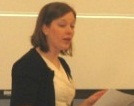 |
F.
DISCIPLINES & PROFESSIONS
19.
Visual
& Multimodal
Design
20.
Writing
in Majors,
Disciplines,
Professions
21.
Job/School
Applications, Resumes, Covers |
Sample
Student
Papers:
See Ch.
12,
16,
20,
&
21. |
This site began its existence through
a grant at the University
of Minnesota.
It also can be found at "OnlineGrammar.org"
and "GrammarBook.org."
Visits as of June 2006-February 2014:
172,500
Visits after Feb. 2014: 
hit
counter
Longhand.jpg)
--------------------
|
Long Table of Contents
(below)
21 Chapters with Descriptions of
Each
(In Six Major Sections, A.-F.)
|
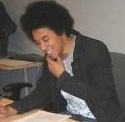 |
Section A., four
chapters
GETTING STARTED
Steps, Focus, How to Think and Read, and Literature |
|
Each chapter is
a list of links:
Introduction:
About This Web Site
Process & Focus:
Focusing, Freewriting, Revising, and Peer Reviewing
How to Think & Read in College: How Both
Relate to Writing
Literature, Reading,
&
Writing: Definitions, Studying
and Writing about Literature, and Free Online Literary Readings
|
 |
Section B.,
three chapters
UNITS OF ENGLISH
Using Words, Sentences, and Paragraphs |
|
Each chapter is
a list of links:
Choosing Words:
Types of Words, Homonyms, Synonyms, Antonyms, Commonly Misused Words, etc.
Making Sentences:
How to Define, Create, and Edit a Sentence
Organizing & Paragraphs: How to Develop
Organization and Thoughts through Paragraphs
|
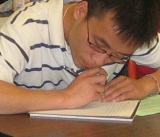
|
Section C., four
chapters
MECHANICS OF EDITING
Editing, Spelling, Punctuation, and Grammar |
|
Each
chapter is a list of links:
General Editing Concerns:
Proofreading and General Editing Guides
Spelling:
Commonly Misspelled Words, Spelling Patterns, and Other Common Spelling
Problems
Punctuation:
How to Use Commas, Quotation Marks, Apostrophes, Colons, Semicolons, etc.
Grammar Guides:
Full Online Guides and Books about Verbs, Nouns, Agreement, Number, etc.
See also "Ch. 15:
Online Writing Textbooks"
for online books on general writing.
|
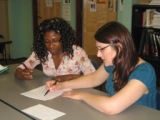
|
Section D., four
chapters
FINDING HELP
Samples, ESL/NNS, Tutors, and Textbooks |
|
Each
chapter is a list of links:
Basic Types
of College Papers--Directions & Samples:
Dozens of Introductory-level College Papers Explained
See also "Ch. 20:
Writing
in
Majors,
Disciplines,
& Professions"
for papers in specific disciplines or professions.
See also "Ch 21:
Job/School
Applications, Resumes, & Cover Letters" for
applications, resumes, and cover letter directions and examples.
Help for ESL/NNS/TESOL/EAP
Writing: Hundreds of Online Resources for Speakers of English as a Second
Language
Online Arguments, Books, & News:
Many Arguments and Editorials; 1+ Million Books and Articles Online
Writing Textbooks
& Tutors: Complete Writing and Composition Textbooks on the Web, and How
to Find a One-on-One Tutor
See also "Ch. 11:
Grammar Guides"
for grammar-guidelines books online.
See also "Ch. 18.
Online Research Resources: Encyclopedias,
Dictionaries, Literary Texts, and Expository Readings" for online reference
books.
|
|
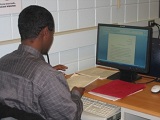 |
Section E., three
chapters
RESEARCH
&
BIBLIOGRAPHIES
Researching; MLA, APA, CBE, AP, and Other Styles;
Research Resources |
|
Each
chapter is a list of links:
Research Writing, Plagiarism, & Samples:
Steps of Research & Writing; What to Do & to Avoid; Sample Papers
Citation &
Documentation: MLA, APA,
CHICAGO/TURABIAN, CBE, AP, et al.
References
& Research
Resources: Encyclopedias,
Dictionaries, Newspapers, and Online Libraries
|
|
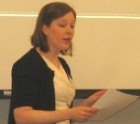
|
Section F., three
chapters
DISCIPLINES,
PROFESSIONS, & MAJORS
Graphic Design;
Papers in Majors, Disciplines,
and
Professions; Applying for
College, Scholarships,
and
Jobs |
|
Each
chapter is a list of links:
Visual
& Multimodal Design:
Using Space, Graphics, and Multimodal Typing and Methods
-
Writing
in Majors,
Disciplines,
Professions:
Writing in the Professions, Disciplines, and Majors--Instructions and Sample
Papers
See also "Ch. 12:
Basic Types of College Papers--Directions & Samples"
for methods and sample papers across multiple
disciplines, s
Applying for Jobs,
College, or Graduate School: Resumes, Application and Cover Letters,
Personal Statements, etc.
|
Return to top.
--------------------
.jpg) |
Section A.--Four
Chapters
GETTING STARTED
Steps, Focus, Thinking, and Reading
(Click on the chapter's title or scroll down.)
Introduction: About This Web Site
Process & Focus: Focusing,
Freewriting, Revising, and Peer Reviewing
How to Think & Read in College: How Both
Relate to Writing
Literature, Reading, & Writing:
Definitions, Studying and Writing about Literature, and Free Online Literary
Readings
|
 |
Chapter 1: INTRODUCTION
About This Web Site (revised
3-12) |
|
WELCOME
Welcome to the
Online Grammar Handbook ("OGH
"), 3rd edition! This 3rd ed. was completed in
2012 with many more links, updates on old links, and new video sections added to
most chapters.
The OGH is not a
normal online book but rather a highly useful directory of links that lead to
literally millions of online materials about writing, grammar, argument,
literature, reading and thinking, and many other writing-related subjects.
It serves as a complete "grammar handbook" with many more resources from a wider
variety of authors, colleges, and universities than grammar handbooks in printed
form. And because of its breadth of high quality links, it offers more
resources about college writing than almost any other writing resource on the
web.
The OGH also presents links to fully online writing
textbooks, hundreds of types of college and professional papers, and many dozens
of excellent sample papers by students. It also offers links leading to
more than one million other readings such as arguments, full-text literary
classics, and nonfiction books and essays.
SELECTION OF LINKS
Four guidelines are used in selecting links:
(1)
Links are appropriate for college and university undergraduates and graduates,
basic/developmental college writers (and high school seniors), and
college-educated professionals using workplace writing.
(2)
Links are as comprehensive as possible, even while offering specific advice.
(3) Links usually are
easily usable.
(4) Links are chosen,
in every section or group of chapters, so that almost any level or type of
writer may find something helpful.
If you would like to have a particularly useful
site reviewed, you may suggest it to the editor for review and possible
inclusion: contact the editor.
HISTORY OF THE
HANDBOOK
1st edition: 2001
2nd edition: 2006
3rd edition: 2012
OGH originally began as a two-year, 1999-2001 project funded at
the University of Minnesota by the College of Liberal Arts Computer and
Technology Committee. The grant was provided to create a large Composition
Program web site, part of which was the OGH. OGH was created
in 2000 and first appeared on the Web in January 2001. At that time,
OGH then became the University of Minnesota College of Liberal Art's
primary online grammar resource, hence its full name, "University of
Minnesota Online Grammar Handbook."
In 2006-2007, OGH received editing of broken links and
minor revision.
In 2007, the University of Minnesota English Department's
Composition Program was combined with writing and rhetoric programs in two other
units to become part of a new department, Writing Studies. A committee in
this new department then chose to develop a newer, much smaller web site for its
composition program. However, OGH still remains on the
University of Minnesota computer server in the editor's personal alumnus
section, and it is updated every four to six years in order to serve its tens of
thousands of users who continue to discover and return to it each year.
THE EDITOR
The
editor, Richard Jewell, is the
founder and co-coordinator of the
Minnesota Colleges and Universities English and Writing ("MnCUEW")
Annual Conference, website (www.MnCUEW.org),
and listserv. The listserv provides a monthly newsletter to over
2000 college and university English composition and literature instructors
and related instructors and staff in Minnesota, Wisconsin, northern Iowa,
and eastern North and South Dakota.
Richard is also
a writing specialist with tenure in English at Inver Hills Community
College in the Twin Cities (Minneapolis-St. Paul) metropolitan area, where
he also is lead coordinator of the college's local chapter of the Phi
Theta Kappa International Honor Society. Before joining the Inver
Hills faculty, Richard was a composition specialist for the University of
Minnesota-Twin Cities and taught writing and other courses at public and
private colleges in the Twin Cities and at St. Cloud State University.
In addition, he has trained elementary, secondary, and college teachers in how
to teach writing, most recently writing in the disciplines for MnSCU (the
Minnesota State Colleges and Universities). He has taught writing for
twenty-eight years and still enjoys it immensely.
His articles and stories have been published over one hundred times in popular
magazines, and he has had a dozen juried and non-juried essays accepted for
academic publication. One of these, coauthored with Chris Anson, is the
lead essay in
Moving a Mountain, a co-winner of the 2003 NCTE (National Council of
Teachers of English) "CCCC Outstanding Book Award." Richard also is the
author of two full-text web books,
www.WritingforCollege.org
and Experiencing the Humanities
and of several other web directories. In addition, Richard has offered
several dozen presentations at state, regional, and national academic
conferences, most recently at CCCC 2012 in St. Louis on the subject of the
stages of the college writer, and at MnCUEW 2012 on how English graduates
can be hired to two-year
college positions. His curriculum vita/resume is at
www.RichardJewell.net.
USING THE
ONLINE GRAMMAR HANDBOOK
Using OGH is simple. You may go to the beginning of
OGH--to the "Short Table of Contents"--and
click on a chapter there; or you may go to the "Long
Table of Contents," read the descriptions there of each section and chapter,
and then click on your choice. Some links lead directly to lessons or
readings, some to videos, and others to lists of other quality sites. If you
have any questions, please
contact the editor.
|
Return to top.
|
 |
Chapter 2:
PROCESS & FOCUS
Focusing, Freewriting, Revising, AND Peer Reviewing
(rev. 5-12) |
|
General and/or Introductory:
Video:
-
Flow:
N.
Carolina (2 min. & 21 sec. in length, slide & audio),
Penn St. (4:25)
-
Generating ideas:
Dickinson Coll.
(several basics, 4:04),
Buffalo St.
(group brainstorming, 5:28),
Cmerci113
(clusters/mind maps/bubbles, 38 sec.),
Purdue
(invention/prewriting, slides & audio, 4:38)
-
How to write a college paper:
ExpertVillage
(12 videos of 30 sec. to 5 min. in length)
-
Peer review:
Indiana U. SE
(5:01)
-
Revising and getting
feedback, 7 videos:
HSteacher1
-
Rhetoric, intro to:
Purdue
(def. & history, slides and audio, 3:27)
-
Starting:
Penn St. (6:25)
-
Writing Process:
Mt. Royal
(basics, 1:47);
Carlabcross (detailed silent slide show,
3:33)
Specific Information:
Generating
ideas/brainstorming/starting/discovering:
Amherst,
Kansas,
Paradigm
(basic),
Winona,
WordStrumpet,
WritingforCollege.org
(detailed)
Graduate writer, tips:
George Orwell,
Tomorrow's Professor
"Moving from Assignment to Topic" for writing:
Harvard
Organizing, general (basic short intro):
Paradigm
Peer reviewing:
Wisconsin
Peer Reviewing--"Running a Small
Group":
WritingforCollege.org
Procrastination:
N. Carolina
Rhetorical modes (modes of
exposition):
Cengage InfoTrac
Revising (basic intros):
Bedford Researcher (links to
descriptions of),
Paradigm (short intro),
WritingforCollege.org (chapter).
See also "Chapter
8. General Editing."
Technical writing processes and guidelines:
PrismNet
Writer's block:
Chicago ,
Penn St.
(intermediate),
Purdue,
St. Cloud
Guerilla Grammar:
Ask a specific question or type a subject at
Ask.com,
Bing, Dogpile,
Google, or Wikipedia.
How to Search
Return to top.
|
|
 |
Chapter 3:
HOW TO THINK & READ IN
COLLEGE
How Both Relate to Writing
(rev. 8-14)
|
|
General/Intro:
Videos about Methods of Critical Reading:
Specific Info:
-
"Avoiding Common Errors in Logic
and Reasoning":
-
Common errors (fallacies) in
logical thinking:
Cengage InfoTrac
-
Close (thorough) reading:
Harvard,
Rutgers
-
Cornell System for taking notes (for a lecture or reading):
Augustana
-
Critical thinking when reading:
Cengage InfoTrac,
Toronto
-
Critical reading and writing
with Toulmin Method:
Colorado St.,
Richmond
-
Critical response:
Syracuse,
Washington,
WritingforCollege.org
-
"How to Read a College Text":
WritingforCollege.org (intro)
-
"How to Read an Assignment":
Harvard
-
Logic in argumentative writing:
Purdue
-
Logical fallacies and poor
logic:
Alberta,
Princeton, Purdue,
Richmond
-
"Moving from Assignment to Topic" for writing:
Harvard
-
Reading well:
Toronto (intro)
-
Reflection/Response:
Colorado St. ("Responding to Written
Texts"),
Harvard (discussion and analysis),
Rensselaer,
Wisconsin,
WritingforCollege.org
-
Research and note taking:
Toronto
Return to top.
|
|
 |
Chapter 4: LITERATURE, READING, &
WRITING
Definitions, Studying and Writing about Literature, and Online Books
(rev. 6-13) |
|
Note: Links in bold have sample/example papers.
General/Intro:
-
Definitions, terminology:
Bedford St. Martin's, CyberEnglish,
VirtualSalt
-
Four sample freshman essays on Shakespeare:
Dartmouth
-
Introductions to writing about lit:
Colorado St.,
Harvard 1 (adv. intro),
Harvard 2 (sr. thes. in history &
lit),
Illinois (intro),
Purdue (general intros),
Cengage
(brief intro),
WritingforCollege.org
(chapters on types)
-
Links to:
Bedford St. Martin's
-
Theories:
Internet Encycl. of Philosophy (general intro to current literary th.),
Mt. Mary (brief descriptions of modern th.),
Purdue
(several in-depth intros),
Rutgers
(about 50 resources and lists),
U.Cal.-Santa Barbara
(hundreds of links),
Wikipedia (general intro)
Videos & Audios of Literature/Literary Authors:
Annenberg Learner Series:
Other Videos:
-
Discovery Channel--brief 1-4 min. intros
to literature:
The Great Gatsby and
Literary Forms,
Dante's Divine Comedy and
Epic Poetry & Allegory,
Symbolism in Literature
-
Lectures on Literary Theory: Yale (25
videos, each 40-50 min.)
-
MediaBistro: Long college-level
lectures by well-known writers Ray Bradbury, Clive Cussler, Maxine Hong
Kingston, Booker Prizewinner Penelope Lively, and Pulitzer Prizewinner
David McCullough
-
WatchKnowLearn: Variety of educational
videos for all ages
-
What is literature/its elements?:
SW Ill. College (college intro, 4:47),
Glendale Comm. College (slide lecture,
6:09),
RiverofColors
(college, 10:25),
Imanav
(basic, 2:08),
AFowles
(basic, 5:11),
Wrynne10
(figurative language, 9:59)
-
WCS English tutorials on basic responses
to literature:
Intro 2 to Writing a Lit. Essay
(3:39),
Intro to P.E.E. (Point-Evidence-Explanation
Essay) (1:44),
P.E.E. Essay 1 (6:43),
P.E.E. 2 (3:27),
P.E.E. 3 (6:13). Also see
How to Write a Lit. Essay (2:57).
-
Writing a literary analysis:
Santa Rosa (college intro),
Poetry, and
Short
Story
-
Writing a literature review:
Massey
(thorough introductory lecture, 25:06)
Specific Info:
-
Analyzing:
Goshen,
Norton (several resources),
Roane
(brief intro)
-
Class presentation:
Claremont (advncd.)
-
Close reading (explication of text):
Bedford St. Martin's (interactive
tutorials),
Claremont (advncd.),
Duke
(creative nonfict.),
Duke 2 (poetry),
Wisconsin (poetry)
-
Creative writing & drama: See "Ch.
20.
Majors,
Disciplines,
Professions."
-
Drama:
North Carolina,
-
Elements:
Purdue, (poetry),
South Florida (fiction, intro)
-
Quizzes about 500 literary works:
Bedford St. Martin's
Quotations, choosing and incorporating from
literature:
Wisconsin
-
Review of play:
Wisconsin
-
Thesis statement:
Colorado St.
-
See also "Introductions to writing about lit"
above in "General/Intro."
Free Online Literature,
Classics and Other:
LibriVox
Children's:
Internet Archive Children's
Library
University repositories:
Digital Library-U.
of Virginia,
Online Books-U. Penn,
Perseus-Tufts U.
Variety:
Bibliomania,
Classic Reader,
Literature
Network,
Page by Page,
Public Literature,
Read Book Online ,
World Public Library
See also "14.
Online Arguments & Books."
Return to top.
--------------------
|
.JPG) |
Section B.--Three Chapters
UNITS OF ENGLISH
Using Words,
Sentences, and Paragraphs
(Click on the chapter's title or scroll down.)
Choosing Words: Types of Words,
Homonyms, Synonyms, Antonyms, Transitions, Commonly Misused Words, etc.
Making Sentences: How to Define,
Create, and Edit a Sentence
Organizing & Paragraphs: How to Develop
Organization and Thoughts through Paragraphs
|
|

|
Chapter 5:
CHOOSING
WORDS
Word Choices, Homonyms,
Synonyms, Antonyms, and Common Misuse
(rev. 5-12) |
|
General/Intro:
Video:
Specific Info:
-
Common errors in English:
WSU
-
Capitalization of words:
NASA (See Chapter 4). Alt.
link:
NASA .pdf
-
Connotation:
St. Cloud
-
"Dealing with New Words" (intermediate/advanced):
Toronto
-
Gender-neutral word choices:
MIT,
Seton Hill U.,
St. Cloud,
U. North Carolina
-
Numbers, capitalization, abbreviations, et al. in MLA, APA, &
Chicago styles: See "Documenting
& Citing"
below.
-
"The Structure of Words":
DuPage College
-
Thesaurus, using:
St. Cloud
-
Transitions:
Purdue,
Harvard,
N. Carolina,
Wisconsin
-
"Who" or "whom"?
St. Cloud
-
Word choice basics for application essays and cover letters:
EnglishClub
-
Word choice and grammar exercises:
Grammar-Worksheets.com
-
Wordiness, eliminating (3 exercises):
Purdue
Guerilla Grammar:
Ask a specific question or type a
subject at
Ask.com,
Bing, Dogpile,
Google, or Wikipedia.
How to Search
Return to top.
|
|
 |
Chapter 6:
MAKING SENTENCES (rev.
4-12)
Definition, Development, and Editing
of Sentences
|
|
General/Intro:
Video & Audio:
-
Basics:
Learn American English (4
videos, 2:42-5:14 min. in
length)
-
Comma splices,
fragments, & run-ons:
HSteacher1
(6:59)
-
Ending sentences
with prepositions OK:
Merriam-Webster (1:52)
-
"Fanboys"
conjunctions (and comma
splices):
mrthoth
(6:51)
-
Five-paragraph
essay:
Jenstrm (basic, 5 videos)
-
Grammar Girl
(audio):
Clarity,
comma splice,
complex-compound,
fragment,
length,
run-on,
semicolons in
-
Grammar and
sentences by
Yossarian the
Grammarian
-
Paragraph unity:
Santa Rosa (college intro)
-
Parallel structure:
Santa Rosa (college),
Massey (college, 28:39)
-
Transitions using "key" and
"echo" words:
Santa Rosa (college)
-
Subject-verb agreement:
HSteacher1
Part A
(9:39) &
Part B (2:50)
Specific Info:
Guerilla Grammar:
Ask a specific question or type a subject at
Ask.com,
Bing, Dogpile,
Google, or Wikipedia.
How to Search
Return to top.
|
|
 |
Chapter 7: ORGANIZING & PARAGRAPHS
Organizing & Paragraphs: How to Develop
Organization and
Thoughts with
Paragraphs
(rev. 6-13) |
|
General/Intro:
Video:
-
Basic intro to using paragraphs, 10 videos:
WriteThatEssay (about 1 min. each)
-
Basics, five-par. essay or essay test:
Calgary-Qatar (10:01)
-
Basics from eHow:
A
paragraph (1:07),
5-par. essay (or essay test) (1:47),
lead par. (1:59)
-
Conclusions, intro:
Critical Thinker Academy (6:58)
-
Introductions, intro:
Critical Thinker Academy (7:13)
-
Paragraph structure:
Massey (college lecture, 28:39),
Phil Stokes (intro, 10:00)
G.E. Walker (basic intro, 9:58)
-
Parallel structure:
Santa Rosa (college)
Specific Info:
-
Beginnings/introductions:
Chicago,
Harvard,
Khatzi (basic)
-
Body paragraphs:
Purdue (1),
Purdue (2),
Illinois,
UC-San Diego (basic)
-
Conclusions:
Chicago,
Harvard (college),
Gallaudet (examples),
Khatzi (basic),
N. Carolina (general)
-
Connecting ideas:
Richmond
-
Five-paragraph essay:
Livingston
(w/example)
Graduate school paper organization:
Claremont
-
Introductions:
Gallaudet (examples),
N. Carolina (general)
-
Outlining:
Harvard (advanced)
-
Patterns, nine typical:
WritingforCollege
-
Rhetorical modes of discourse for paragraph development:
WritingforCollege,
Newsroom101
-
Tone:
Basic Composition
-
Topic sentences:
Harvard
-
Transitions parag. to parag.:
Purdue,
Writers' Corner
-
Types of paragraphs, nine rhetorical methods:
PatternBasedWriting
-
Length:
Purdue
Guerilla Grammar:
Ask a specific question or type a
subject at
Ask.com,
Bing, Dogpile,
Google, or Wikipedia.
How to Search
Return to top.
--------------------
|
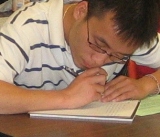 |
Section C.--Four Chapters
MECHANICS OF EDITING
Grammar, Spelling,
and Punctuation
(Click on the chapter's title or scroll down.)
General Revising & Editing Concerns:
Revising, Editing, and Proofreading
Spelling: Commonly Misspelled Words,
Spelling Patterns, and Other Common Spelling Problems
Punctuation: How to Use Commas,
Quotation Marks, Apostrophes, Colons, Semicolons, etc.
Grammar Guides: Full Online Guides
and Books about Verbs, Nouns, Agreement, Number, etc.
See also "Ch. 15:
Online Writing Textbooks"
for online textbooks & handbooks on general writing.
|
|
 |
Chapter 8: GENERAL REVISING &
EDITING CONCERNS (rev.
4-12)
Editing, Guides, and Proofreading |
|
General/Intro:
Video & Audio:
Specific Info:
-
10 common college/business beginner errors:
EnglishGrammar.org
-
Active/Passive Voice:
Purdue
-
Common Errors in English:
Dartmouth,
East Tennessee,
Washington State
-
Editing:
St. Cloud
-
Graduate writer, tips:
George Orwell,
Tomorrow's Professor
-
Parts of Speech/grammar:
NASA (See Chapter 1). Alt. link:
NASA .pdf
-
Punctuation in British English:
Sussex
-
Punctuation in U.S. English:
Capital
-
Proofreading:
Elements of Style,
Indiana,
Purdue,
Wisconsin
-
Reading backward, out loud, in print, allowing time:
Grammar Girl
-
Revising, the basics:
DailyWritingTips,
Edmonton Schools
-
Revising, college:
Chicago (chptr.),
North Carolina
-
Revising creative writing:
Allen Ginsberg (poetry),
About.com (fiction)
-
Revision overview:
Dartmouth,
UC-San Diego (for a thesis)
-
"Seven Deadly Sins of Writing:
Hamilton (brief)
-
Style, revising for:
Dartmouth
-
Typing:
UC-San Diego (basic intro)
-
Usage/parts of speech/grammar:
Elements of Style, GrammarBook.com,
Grammar Girl,
Northern Iowa
Guerilla Grammar:
Ask a specific question or type a
subject at
Ask.com,
Bing, Dogpile,
Google, or Wikipedia.
How to Search
Return to top.
|
 |
Chapter 9: SPELLING
Spelling Patterns, Common Misspellings, and
Other Spelling Problems
(rev. 5-12) |
|
General/Intro:
Video:
-
Basic, practical spelling rules for college (slides):
Capital
-
Common 1st-yr. college misspellings:
WhatTravisSays (4:24)
-
Learning disabilities and reading, "How the Brain Reads"
(advanced/graduate):
Harvard (1:21:59)
-
Learning disabilities/dyslexia and spelling (intro):
BonnieTerry238 (4:57),
Kennedy/Marshall (6:45),
TVNZ
(1:45),
-
"Look, say, cover, write" method of learning spelling
(basic):
HowToSpell.co.uk (3:21)
Specific Info:
Guerilla Grammar:
Ask a specific question or type a
subject at
Ask.com,
Bing, Dogpile,
Google, or Wikipedia.
How to Search
Return to top.
|
|
.
? !
,
:
;
' '
" "
-
--
( )
. . . [ ] |
Chapter 10: PUNCTUATION
Use of Commas, Quotation Marks, Apostrophes, Colons, Semicolons, etc.
(rev. 5-12) |
|
General/Intro:
Video & Audio:
Specific Info:
APA style punct.:
St. Mary's
-
Apostrophe:
GrammarBook,
Ntnl.Punct.Day,
Purdue
-
Brackets ( [ ]
):
GrammarBook,
Ntnl.Punct.Day
-
Comma, conquering the (slides):
Purdue
-
Comma rules:
GrammarBook,
Ntnl.Punct.Day,
Purdue
Capitalization:
NASA (See Chapter 4). Alt. link:
NASA .pdf
Dashes ( - & -- ):
GrammarBook,
Ntnl.Punct.Day
Ellipsis ( . . . ):
GrammarBook,
Ntnl.Punct.Day
Emphasis using punct.:
NASA (See Chapter 2.6.2). Alt. link:
NASA .pdf
Hyphens:
GrammarBook,
Ntnl.Punct.Day,
Purdue
MLA style punct.:
Dr.AbelScribe
Parentheses (
( ) ):
GrammarBook,
Ntnl.Punct.Day
Sentence punct.:
Purdue (1)
(patterns of),
Purdue (2) (in sents.)
Semicolon:
Purdue
(slides & audio, 4:36)
Quotation marks:
GrammarBook,
Ntnl.Punct.Day,
Purdue
Guerilla Grammar:
Ask a specific question or type a
subject at
Ask.com,
Bing, Dogpile,
Google, or Wikipedia.
How to Search
Return to top.
|
|
 |
Chapter 11: GRAMMAR
GUIDES
Excellent Online Guides about Verbs,
Nouns, Agreement, Number, etc.
(rev. 3-13)
See also "Ch. 15:
Online Writing Textbooks"
for online textbooks & handbooks on general writing. |
|
Basic Guides:
Grammar Checkers & Tutors:
Microsoft Word grammar and spelling checker (already installed free in your
Word writing program)--how to use it:
Microsoft
"Grammarly" recommended as best online grammar checker:
TopTenReviews
"Grammarly" not recommended for offline use as a downloaded
add-in/software:
TopTenReviews
Tutor or other helper, finding a: See "15.
Writing Textbooks & Tutors."
Video & Audio:
College-level Review, Intermediate, & Advanced:
Guerilla Grammar:
Ask a specific question or type a
subject at
Ask.com,
Bing, Dogpile,
Google, or Wikipedia.
How to Search
Return to top.
--------------------
|
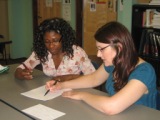 |
Section D.--Four
Chapters (Click on the chapter
names or scroll down.)
FINDING HELP ONLINE
Online Samples, Tutors, ESL/NNS, and Textbooks
Basic
Types
of College
Papers--Directions
& Samples: Dozens of
Introductory-level College Papers Explained, Many with Samples
See
also "Ch. 20:
Writing
in
Majors,
Disciplines,
& Professions"
for papers in specific disciplines or professions.
See also "Ch 21:
Job/School
Applications, Resumes, & Cover Letters" for
applications, resumes, and cover letter directions and examples.
Help for ESL/NNS/EAP Writing: Hundreds of Online Resources
for Speakers of English as a Second Language
Online
Arguments, Books, & News:
Many Arguments and Editorials; 1+
Million
Books and Articles Online
Writing Textbooks & Tutors: Complete
Writing and Composition Textbooks on the Web, and How to Find a One-on-One
Tutor
See also "Ch. 11:
Grammar Guides"
for grammar-guidelines books online.
See also "Ch. 18.
Online Research Resources: Encyclopedias,
Dictionaries, Literary Texts, and Expository Readings" for online reference
books.
|
|
 |
Chapter 12:
SAMPLES OF
GENERAL COLLEGE PAPERS &
METHODS OF WRITING THEM
Dozens of Types of Papers
Explained (rev.
2-13)
See also "Ch. 20:
Writing
in
Majors,
Disciplines,
& Professions"
for papers in specific disciplines or professions.
See also "Ch 21:
Job/School
Applications, Resumes, & Cover Letters" for
applications, resumes, and cover letter directions and examples.
|
|
This chapter contains short and medium lessons--basic,
intermediate, and advanced, some with sample papers--for general papers in
the first two years of college. There also are some lessons and
samples for college basic/developmental courses or late-high school
equivalents. For more advanced or specific types of papers, see "Ch.
20."
General/Intro:
-
Capital College's
Directions and Samples for Simple Papers under "Patterns of
Composition": Personal Essay, Narrative or Descriptive,
Describing a Process, Comparison/Contrast,
Classification/Analysis, Definition, Evaluation/Review, Cause
and Effect, Argumentative Essay, Writing about Literature, MLA
or APA Research Paper
-
Colorado State's "Writing
Documents" in the fields of composition and academic writing,
argument, literature, scholarly writing, business, science,
engineering, web writing, and speeches and presentations--some
with and some without sample writings
-
Cornell College's
Brief, Simple Guides to Writing in Courses: Art History,
Classics, Economics & Business, Elementary Education, Geology,
German, International Relations, Music Psychology, Science,
Spanish, Women's Studies
-
Gallaudet's
brief introductions to eight types of essays based on rhetorical
modes
-
Writing for College's dozens of samples, examples,
and chapter-length descriptions of how to write them
Video & Audio Introductions to Types of Papers:
-
ABSTRACT:
Maryland (for advanced experiment,
6:50),
Texas A&M (in many disciplines, 17:18)
-
ANALYSIS, EVALUATIVE:
SUNY
Cortland (basic; slides, 0:42)
-
ARGUMENT AND CRITICAL THINKING:
Derren Brown (six 10-min. videos)
-
COLLEGE ESSAY, variety of types: 6 brief, basic, intro videos:
SmartThinking
-
BOOK REVIEW, brief intros:
eHow 1 (basic, 1:41),
eHow
2 (critical review, 2:00),
eHow (graduate book report, 2:11)
-
EMAIL ETIQUETTE:
Purdue (slides)
-
EVALUATION: See above, "Analysis."
-
LITERATURE REVIEW IN A DISCIPLINE: See, below, "Review of
Literature."
-
LITERATURE, writing about: See "Ch. 4.
Writing about & Reading Literature."
-
PERSONAL ESSAY:
Santa Rosa (intro college)
-
REPORT:
Massey
(introductory lecture, 30:24)
-
REVIEW OF LITERATURE IN A DISCIPLINE:
Maryland (5:22),
N. Carolina State (9:39)
-
SPEECHES:
American Rhetoric Speech
Bank (audios)
-
SUMMARY:
Howcast (of chapter/book, basic,
2:11),
Internet
Expert Guides (short and quick, 1:52),
Presentation Expressions (of presentation, basic, 2:53),
San Diego
(college intro in MLA, 2:25)
Waubonsee
(college intro, 5:38)
-
THESIS, 5-STAR (5-paragraph), basic:
Eng. for Everyone (27 videos)
-
THESIS, college intro to:
Maryland (th. statement, 6:38),
Maryland U. Coll. (th. statement,
1:54),
Massey (th. ppr., 19:50)
-
THESIS W/COUNTERARGUMENTS--methods:
Critical Thinker Academy, (intro,
9:51)
Eng. for
Everyone 1 (basic, 7:52),
Eng. for Everyone 2 (basic, 5:52)
Specific Types of Papers:
Note: Sites with samples/examples are in
BOLD.
WARNING:
Please do NOT copy--without giving credit--even
one phrase or sentence of samples/examples. Doing so is called
"plagiarism," one of the greatest of academic sins. Are teachers
able to identify plagiarized papers easily?
Yes! To see why, click
on "Yes!"
or see "Plagiarism in "Chapter
16."
However, you may mimic the academic or professional style, tone, or
voice of these papers, if you wish. Doing so is not plagiarism but
rather experimentation and practice. (You may also quote or
paraphrase portions of these papers if you give proper credit in the
text and in your bibliography.)
-
ABSTRACT:
Colorado St.,
Illinois (brief),
Princeton-Wash.,
Rensselaer,
St. Cloud.
-
ANALYSIS, GENERAL:
Colorado St. (content),
Harvard (comparative),
Iowa
State (rhetorical),
Purdue (stasis inquiry)
-
ANALYSIS, LITERARY: See "Ch. 4.
Writing about & Reading Literature."
-
ANNOTATED BIBLIOGRAPHY with samples:
Cornell U.,
Memorial,
St. Cloud,
Toronto,
Wisconsin.
-
APPLICATION LETTER: See "Ch 21:
Job/School
Applications, Resumes, & Cover Letters
-
ARGUMENT (see also "Counterargument," "Essay exam," and
"Thesis"):
Paradigm (simple intro),
Colorado St. (general),
Colorado St. (Toulmin method),
Columbia
(scientific using IMRaD),
Earlham (adv., 4 stages/levels of),
Purdue
(argumentation),
Purdue (thesis ppr. structure),
Roane
(w/research)
-
AUTOBIOGRAPHY:
Duke
-
BOOK REVIEW: See, below, "Critical review."
-
CLASSICATION or DIVISION:
Roane
-
COMPARISON/CONTRAST:
St. Cloud,
Toronto (intro)
-
COUNTERARGUMENT (in your own thesis):
Harvard,
Paradigm,
Purdue,
UC-San Diego
-
COVER LETTER: See "Ch 21:
Job/School
Applications...."
-
CREATIVE WRITING--fiction, nonfiction, & poetry: See "Ch. 20.
Writing
in Majors,
Disciplines"
-
CRITICAL REVIEW (see also, below, "Reflection/response"):
Rensselaer (critique),
St. Cloud 1 (intro),
St. Cloud 2 (prewriting questions),
Wisconsin 1,
Wisconsin
2. (See also "Review" or "Film" in "Ch.
20.
Writing
in
Majors,
Disciplines,
& Professions.")
-
CURRICULUM VITA: See "Ch 21:
Job/School
Applications...."
-
DEFINITION:
Purdue (1-2 sents.),
St. Cloud (essay)
-
DESCRIPTIVE ESSAY:
Purdue,
Roane,
St. Cloud
-
DIALOGIC/DISAGREEMENT:
Writing for College
(chapter). See also "Counterargument."
-
EMAIL:
Colorado St. 1 (general),
Colorado St. 2 ("Courtesies"),
Gallaudet,
Purdue (etiquette)
-
ESSAY EXAM:
Colorado St.,
Purdue, and
InfoTrac,
Illinois (in-class, brief intro),
Illinois (standardized test essay, brief intro)
-
ESSAY WRITING, intro:
Livingston
(5-parag.), Purdue
(general)
-
ESSAYS, prizewinning: See "Perfect Papers"
in the OGH
-
EXLORATORY ESSAY:
Paradigm
-
EXPOSITORY ESSAY:
Purdue
-
INTERNATIONAL AUDIENCE, writing for:
Columbia (very brief intro)
-
LETTERS (email and surface mail):
Gallaudet
-
LITERATURE:
See "Ch. 4.
Literature &
Books";
also see "English" in "20.
Writing
in Majors,
Disciplines,
Professions."
-
MODES OF RHETORICAL DISCOURSE: See
Purdue.
Also see "Analysis," "Argument," "Comparison/contrast," "Definition,"
Description," "Division/classification," "Exposition," "Process," "Narration,"
-
NARRATION:
Purdue,
Roane,
St. Cloud
-
ORAL PRESENTATION: See "Speech."
-
PERSONAL STATEMENT: See "Ch 21:
Job/School
Applications, Resumes, & Cover Letters
-
POSTER PRESENTATION:
Colorado St.
-
PRESENTATION and SPEECH:
Colorado St. and
Rensselaer
-
PROCESS:
St. Cloud
-
PROPOSAL:
Illinois (intro)
-
REFLECTION/RESPONSE/REACTION:
Colorado
St. ("Responding to Written Texts"),
Harvard (discussion and analysis),
Rensselaer,
St. Cloud,
Writing for College
(chapter)
-
RESEARCH: See Ch. 16:
Research Writing, Plagiarism, & Samples
-
RESUME: See "Ch 21:
Job/School
Applications, Resumes, & Cover Letters
-
RHETORICAL MODES: see "Modes."
-
SPEECH:
American Rhetoric Speech
Bank (texts),
Toronto
-
SUMMARY:
Colorado St. (academic, executive, & abstract),
Duke
(brief intro),
Illinois,
Santa Rosa (intro),
Writing for College (chapter)
-
SYNTHESIS:
Concordia-Moorhead (example),
Michigan State (general intro).
See also "Analysis" and "Thesis."
-
TEST ESSAY: see "Essay exam" above.
-
THESIS (see also "Argument"):
E.
Michigan (research ppr.),
Harvard 1 (advanced intro),
Harvard 2 (counterargument in),
Harvard 3 (Scroll down to bottom list "Strategies
for Essay Writing"),
Harvard 4 (Scroll down to
bottom-list senior theses in "DISCIPLINARY WRITING GUIDES"),
Paradigm (simple
intro),
Princeton
(junior research project),
Purdue (structure and development),
Rensselaer
(advanced brief intro),
Santa Rosa (college intro),
UC-San
Diego (brief, simple test of),
Writing for College
(chapter)
Guerilla Grammar:
Ask for a specific type of paper at
Ask.com,
Bing, Dogpile,
Google, or Wikipedia.
How to Search
Return to top.
|
|
 |
Chapter 13:
ESL/NNS/EAP WRITING (rev.
6-13)
Hundreds of Resources for Nonnative Speakers of
English as a Second Language |
|
General/Intro:
Video & Audio:
Specific Info:
American
English on the web--some popular audio & video sources:
American English on the web, audio & video sources:
Guerilla Grammar:
Ask a specific question or type a
subject at
Ask.com,
Bing, Dogpile,
Google, or Wikipedia.
How to Search
Return to top.
|
|
 |
Chapter
14:
ONLINE ARGUMENTS,
BOOKS, & NEWS
Many Arguments and Editorials; 1+
Million
Books and Articles Online
(rev. 4-13) |
|
Short Argumentative Readings:
Video and Audio:
Learn Out Loud (variety of audio and video debates)
Vimeo Debate Videos (199 debate videos)
To find specific argument or debate videos, use a search
engine. In the search box, type the
name of your subject, and
|
type after it the phrases
____ argument
video
____ debate video
or
____ argument/debate audio. |
For example, you might search for
military force argument video
world peace debate video
or
resistance to war
debate audio. |
Editorials:
-----
Online Books, Journals, Newspapers, &
Magazines on Many Subjects:
Guerilla Grammar:
Searching for a specific subject? Be careful of
what you find! If you want sites your instructor will accept, get rid
of the ones that do NOT use provable/proven facts and scholarly support.
Once you know how to truly evaluate websites, then you can search: use
Ask.com,
Bing, Dogpile, or
Google for arguments.
How to Search
Return to top.
|
|
 |
Chapter 15:
WRITING TEXTBOOKS & TUTORS
Complete Writing and Composition Textbooks Online
for College Writers; How to Find Extra Help
(rev. 5-12)
See also "Ch. 11:
Grammar Guides"
for grammar-guidelines books online.
See also "Ch. 18.
Online Research Resources: Encyclopedias,
Dictionaries, Literary Texts, and Expository Readings" for online reference
books.
|
|
General Writing e-Textbooks (long) & Handbooks (slightly
shorter):
The Informed Writer by Charles
Bazerman (housed at Colorado State)
"Learning
in the Academy--An Introduction to the Culture of Scholarship" by
Creighton University is a 40 p. handbook on academic learning, work, and
integrity.
Leo: Literacy Education Online by Sharon Cogdill and Judith Kilborn,
St. Cloud State University (general intros to basic and college writing)
The Norton Field Guide to Writing:
general intro to college writing but especially useful for classes that are
writing about literature
Online Guide to Writing and Research
by the University of Maryland University College
Online Technical Writing by David A.
McMurrey at PrismNet
Paradigm Online
Writing Assistant by Chuck Guilford, Boise State University: a very
popular, simple intro to college-level and basic/developmental writing
The Process of
Research Writing by Steven Krause, Eastern
Michigan University (intermediate college-level intro to research writing)
Purdue OWL
and its
Workplace Writing
are the equivalent of two writing books in themselves.
Purdue OWL
is a general introduction to writing, especially argument and research.
Workplace
Writing is an excellent introduction to a wide variety of workplace
writing styles and assignments.
Resources for Writers is DePaul
University's simple, understandable, brief introductions to many types of
papers, assignments, research, grammar, and revision.
Rhetoric and Composition--A Guide for the College Writer:
a Wikibooks Textbook by Multiple Authors and by Matt Barton, St. Cloud State
University.
Writing in College: A Short Guide by Joseph Williams and Lawrence
McEnerney, University of Chicago (an intermediate college-level intro for general
writing)
University of North Carolina Writing Center Handouts & Demos:
especially useful for the writing process, editing, andhelp in how to write
different types of papers
University of Richmond Writer's Web: a good
introductory handbook for college writing
University of Wisconsin-Madison Writer's Handbook
(basic and advanced college level)
Writing Spaces: Readings on Writing
Vol. I and
Vol. II edited by Lowe and Zemliansky (housed
at Colorado State)
Workplace Writing: See "Purdue OWL" above.
Web Style Guide is an excellent
guide, well illustrated, to working with web sites from simple forms or Word
versions to complex programs.
WritingCommons.org/CollegeWriting.org
is for students in college writing and research courses.
It has chapters at intermediate-advanced composition levels by many univ. and
coll. professors.
Writing for
College by Richard Jewell, Minnesota State Colleges & Universities
(and housed at Univ. of Minn.), is a wide-ranging manual for intro,
intermediate, and adv. college composition and for basic/developmental
writing.
Video & Audio Sets/General Guides:
Citation & documentation w/MLA & APA, 8 brief intro slide shows
w/audio:
Creative writing, publication, and literature, 100 videos:
Speeches (audio):
American Rhetoric Speech
Bank (100s)
-
Grammar videos: See "Chapter 11.
Grammar Guides"
-
Writing and grammar (audio):
Grammar Girl (dozens)
-
Basic and writing for publication, 15 videos &
audios:
James Adams
-
Book writing, popular or creative, 23 videos:
Jackson
Pearce
-
College writing, 9 brief videos from 9 faculty
members: Hope
-
ESL/NNS videos and audios, resource lists of
many:
-
English Meeting
(resource list of 100s),
English with Jennifer (254 short, basic lessons),
-
Grammar: dozens of podcasts--some audio, some
slides & audio, and several video--on grammar and other writing subjects:
Texas A&M (Access them
faster by using the search phrase "TAMU podcast" with your grammar or punct.
need: e.g., "TAMU podcast semicolon.")
-
News writing, 15 half-hr. audios:
Shasta/Annenberg/KHSL-TV
-
Research writing in college, 10 short slide
shows w/audio:
U.
Cal.-Davis (scroll down to "How to Write")
Citation & documentation w/MLA & APA, brief intros: slide
shows w/audio:
-
Simple, basic, brief tips for public,
college-entrance, or work-related writing, 21 videos:
eHow
-
Writing, grammar, and punctuation, 22
short videos:
Purdue OWL
Getting Help from Tutors & Others:
-----
-
Tutoring at no cost (free):
(1) Ask your school or major public library how to find "writing center" or
"tutoring center" help.
(2) For advice, see "Finding a Tutor."
(3) If you need location lists, see
International Writing Centers Association.
-
Tutoring for a paid fee:
(1) Read section "c" in "Finding a Tutor."
(2) Then use a web browser to search for these phrases: "writing tutor" or
"writing tutor college."
Guerilla Grammar:
Ask a specific question or type a
subject at
Ask.com,
Bing, Dogpile,
Google, or Wikipedia.
How to Search
Return to top.
|
--------------------
.jpg) |
Section E.--Three Chapters (Click
on the chapter names or scroll down.)
ONLINE RESEARCH & BIBLIOGRAPHIES
Researching, MLA, APA, CBE, AP, and Other Styles and Resources (rev.
6-12)
Research Writing,
Plagiarism, & Samples: Steps of Research & Writing; What to Do and to
Avoid; and Sample Papers
Citation & Documentation:
MLA, APA, CHICAGO/TURABIAN, CBE, AP, et al.
References
& Research
Resources: Encyclopedias, Dictionaries, Newspapers,
and Online Libraries
|
|
 |
Chapter 16:
RESEARCH WRITING,
PLAGIARISM, & SAMPLE PAPERS
(rev.
5-12. addtns. 6-12, 9-14)
Steps of Research and Writing; What to Do and
to Avoid; and Sample Papers |
|
Research Papers--Excellent Samples/Examples:
WARNING:
Please do NOT copy--without giving credit--even
one phrase or sentence of samples/examples. Doing so is called
"plagiarism," one of the greatest of academic sins. Are teachers
able to identify plagiarized papers easily?
Yes! To see why, click
on "Yes!"
or see "Plagiarism in "Chapter
16."
However, you may mimic the academic or professional style, tone, or
voice of these papers, if you wish. Doing so is not plagiarism but
rather experimentation and practice. (You may also quote or
paraphrase portions of these papers if you give proper credit in the
text and in your bibliography.)
-
Composition Rsrch. Pprs. from
Diana Hacker: MLA
and
APA
-
Composition Rsrch. Pprs. from Purdue
w/discussion:
MLA
and
APA
---
-
Freshman-level
award-winning research paper:
Roane State College
-
Freshman/sophomore APA social sciences
paper:
Hamilton (w/notes)
-
Undergraduate: Palmquist, six student
research papers from rough to final draft:
Bedford Researcher
-
Undergraduate IMRaD biology lab report w/research &
charts:
Hamilton
-
Undergraduate: Hacker &
Fister, student research papers, one each in humanities (MLA),
social sciences (APA), history (Chicago), & sciences (CSE) with
running notations:
Research and Documentation
-
Junior-senior: Award-winning MLA Research
Paper:
University of Minnesota
-
Junior, senior, and graduate-level course
assignments: Dozens of undergraduate research journals online with hundreds
of published undergraduate research papers online:
Council on Undergraduate Research
-
Graduate theses and dissertations,
hundreds available:
DART Europe,
Networked Digital Library
-
For sample papers in specific disciplines, see "Ch. 20.
Writing
in Majors,
Disciplines,
Professions
Video & Audio:
-
Boolean
operators: See "search words" below.
-
Citing
(giving credit), importance of:
W. Virginia (intro, audio, 4:39)
-
Databases, how to
use:
Monmouth Cty.
-
Evaluating sources:
Maryland
(audio & text, 5:16),
Portland (7:52),
W. Virginia (slides & audio, 3:55). See also "Evaluating
websites" below.
-
Integrating sources:
W. Virginia (intro, slides & audio, 4:54)
-
Plagiarism, avoiding:
Acadia
(interactive cartoon slides, about 10 min.), Critical Thinker Academy
#1 ("don't copy," 1:05) &
#2 ("what to cite," 1:05),
Sea Devil TV
(intro, 7:32),
UCLA
(slides & cartoons),
What is Plagiarism?--humorous
videos from Rutgers University about plagiarism
-
Primary
vs. secondary sources, intro:
California-San Diego (3:02),
Hartness (4:34)
-
Process
or steps of research, intro:
Ferris St.
(slides & audio),
W. Virginia (audio,
7:04),
DrPPrice
(slides & audio, 5:28)
-
Search
engine vs. research database:
YosemiteCCD (1:58)
-
Search
words (boolean operators):
Auckland (slides &
audio, 4:50)
-
Web
sources, good vs. poor: See "Evaluating sources" above and below.
Excellent Research Writing e-Textbooks and
Handbooks:
Specific Info:
ABC's of searching the web:
OGH
Academic community, credibility, and integrity:
Dartmouth
Annotated bibliography:
St. Cloud State
Boolean operators: See "Search words" above and
below.
-
Databases:
Goucher
(optimal search methods for),
Monmouth Cty. (intro)
Definitions--research terms:
Research and Documentation Online
Eight brief lessons on quoting, paraphrasing,
citing, and making a bibliography:
Minnesota
"The Ethical Researcher" (resources):
NoodleTools
Evaluating web
sites:
ASHA
(resource lists),
Minnesota,
Research and Documentation Online by
Hacker & Fister,
UC Berkeley. See also "Evaluating
sources" above.
Field research links:
Bedford Researcher by Palmquist
-
"Finding Sources" in Humanities, Social Sciences,
History, and Sciences:
Research and Documentation Online by
Hacker & Fister
Graduate school writing and research resources:
Claremont,
Minnesota
High school biography writing, steps of:
Bellingham Public Schools
Internet research:
Toronto
-
Juried: See "Scholarly sources."
-
Note taking for research:
Toronto
Paraphrasing:
Purdue
(college intro),
St. Cloud
(basic intro),
Wisconsin 1 (general intro),
Wisconsin 2 (good vs. bad paraph.)
Peer reviewed:
See "Scholarly sources."
Plagiarism, learning what it is and avoiding it:
Bedford Researcher
(4 tutorials),
"Big
Problem?" in OGH,
Plagiarism.org,
St. Cloud (college intro),
Writing for College
Primary vs. secondary sources, using each:
Toronto (general intro)
Quotations, choosing and incorporating from
literature:
Wisconsin
Quoting:
Purdue (college intro),
St. Cloud (basic intro),
Wisconsin (general intro)
Process or steps of research:
Drexel (basics, h.s. & college),
Illinois (brief steps),
Gallaudet,
Minnesota (eight "QuickStudy" steps),
Wisconsin
(brief, general intro),
BestColleges.com (sophisticated overview of research process in college)
Research strategies booklet:
Minnesota
Scholarly sources (peer reviewed, refereed, juried): ,
St. Vincent's (brief list)
Search engines:
Daytona
(brief lists)
Search words (boolean operators):
Washburn
(simplified w/examples)
Secondary sources: See, above, "Primary and
secondary sources."
Tutor, finding a: See "
Guerilla Grammar:
Ask for a specific type of discipline with the word
"writing" or "research" at
Ask.com,
Bing, Dogpile,
Google, or Wikipedia.
How to Search
Return to top.
|
|
 |
Chapter 17: CITATION
& DOCUMENTATION
Parenthetical and Other Citations, Bibliographies, and Footnotes;
MLA, APA, Chicago/Turabian, CSE, AP,
et al. (rev.
6-12) |
|
Sample Papers: See "Ch. 16.
Research Writing,
Plagiarism, & Samples," above.
Note about Styles:
"MLA" is used most often in English, humanities, and
college
writing classes.
"APA" is used most often in the social sciences and most nursing
disciplines.
"Chicago/Turabian/CMS" is used most often in history and public
affairs.
Other disciplines often have their own styles, many listed below.
General/Intro:
-
Hacker & Fister (brief
intros w/examples in four disciplinary areas)
-
Paradigm (brief, general basics)
-
Wikipedia
(good longer definition of "citation")
-
See
also "Ch. 16.
Research, Writing, & Plagiarism,"
above, for good online manuals on research, documentation, and citation, along
with sample papers containing exemplary bibliographies and citations.
Bibliography Makers:
Note: The web page asks questions; you answer. It then writes the
bibliography, and you copy it to your paper.
Citation
Machine (basic, free): MLA, APA, Chicago/Turabian
EasyBib
(basic free): MLA
EasyBib Premium
(advanced, subscription or trial): MLA, APA, Chicago
NoodleTools
Starter/NoodleBib (basic, free): MLA
NoodleTools (advanced, subscription
or trial): MLA, APA, Chicago/Turabian
Video:
APA formatting basics:
Purdue (slides &
audio, 4:48),
Wisconsin
(slides & audio, 4:47)
APA formatting of typing:
Dakota State
(video tutorial)
APA abstract, advanced:
Maryland (6:50)
Citation & documentation w/MLA & APA, brief intros: slide
shows w/audio:
MLA formatting basics:
Columbia
Gorge (7:50),
Purdue 1 (slides &
audio, 3:01),
Purdue 2
(slides only, 6:54),
Cockrum
Videos/Purdue (bibliographies, slides & audio,
7:29),
Wisconsin (slides & audio, 3:57)
Paraphrases (avoiding plagiarism):
Maryland (3:14)
Primary vs. secondary sources:
Hartness Library (basic, 4:34)
Research, social/psychological:
Rey Ty (intro slides, 3:14),
Brigham Young (good questions, 8:21),
Florida
(basic methods, 2:16)
Specific Styles, MLA & APA:
(Note: In introductory writing courses, use MLA unless
your instructor says otherwise.)
MLA:
(1) "MLA...Lite",
Purdue,
Texas,
Research & Documentation,
Wisconsin
(2) PDF about changes in 7th Ed.:
Houston-Victoria
(2 pp.)
(3) PDF of 7th ed. documentation guidelines:
Glendale
(34 pp.)
(4) Sample paper: See "Ch. 16.
Research Writing & Plagiarism,"
above.
Advanced resources:
Iowa,
Colorado Style Guides lists
Other Styles:
AAA (Anthropology):
AAA Net
AP (Journalism):
Purdue,
AP (Journalism), alternative:
Missourian (1),
Missourian (2)
APSA (Political Science; similar to Chicago
style):
Wisconsin
ASA (Sociology, Psychiatric Nursing):
Purdue, Wisconsin
Chicago/Turabian/CMS
(History):
Chicago Manual of Style,
Colorado Style Guides lists,
Purdue,
Research & Documentation,
Wisconsin
CSE (Science): ,
Colorado Style Guides lists,
Wisconsin,
Hacker's
Research & Documentation,
Colorado (advanced),
Wisconsin
Government Documents:
Colorado (advanced)
Legal Citation:
Cornell U
-
6 styles
with a number of guides:
Cal State LA
-
16 styles
w/documentation and citation guides (MLA, APA, CSE, CMS, et al.):
Hampton
-
100s of examples
of senior/graduate research papers in multiple disciplines:
Council on Undergraduate Research
(online undergraduate research journals with online research papers)
Guerilla Grammar:
Ask a specific question or type a subject at
Ask.com,
Bing, Dogpile,
Google, or Wikipedia.
How to Search
Return to top.
|
|
 |
Chapter 18: REFERENCES & RESEARCH RESOURCES (rev.
6-12)
Encyclopedias, Dictionaries, Newspapers,
and Online Libraries |
|
Note: Usually you should not quote dictionaries and any general
encyclopedia in papers except, possibly, Brittanica. Why?
In "Big Problem?" in this website, see "7. Why
won't my professor let me use Wikipedia...." However, some
professors allow quotations from "subject" encyclopedias and
dictionaries--ask your professor.
General References (Dictionaries,
Encyclopedias, etc.)
Dictionaries:
Merriam-Webster,
Webster's Multilingual,
Your Dictionary,
Dictionary lists and search engines:
Dawson
(basic),
Encyclopedia.com,
Internet Public Lbry.,
Lexicool
(wide variety, multilingual),
OneLook,
Vocabulary (popular),
Yahoo (popular)
Encyclopedias:
Britannica Online,
Columbia,
Internet Public Lbry.,
Merriam-Webster,
Wikipedia
(multilingual),
Encyclopedia lists and search engines:
Encyclopedia.com
(popular),
Ohio (academic),
Yahoo (popular)
Reverse dictionary:
OneLook
(Describe concept to find its word.)
Thesauruses:
Merriam-Webster,
Roget's,
Thesaurus.net (w/spellcheck),
Webster's Multilingual,
Your Dictionary
Video:
-
40 videos at
Merriam-Webster
-
Choose a word and search for it as
a video: for example, "__[word]__ video."
-
Google as a dictionary:
Answers.com (1:53)
-
Sign language:
ASL
Pro (thousands of words)
-
Video dictionary:
Vidtionary (basic/ESL/NNS)
-
Google as a video
dictionary/encyclopedia:
Step 1: Type "define" and a colon (":"),
and a word immediately after the colon with no space.
Example: define:neptune
planet
Step 2: Then, in the left column of
Google, click on "Videos."
Specific Subjects/Reference Works:
ASL (American sign language):
Lifeprint (10,000+ images)
Biography:
Biographical Dictionary
Business:
Your
Dictionary
Colleges & universities directory:
Texas
Computer:
Your Dictionary
ESL/NNS:
M-W Learner's
Dictionary, Newbury
House Dictionary,
Oxford Learners Advncd.,
Webster's Multilingual,
Finance/investment:
Your
Dictionary
Grammar dict.:
Answers.com
Legal:
Your Dictionary
(terms),
LexisNexis (research)
Libraries online:
Internet Public Library,
Library of Congress,
Library Spot
Medical terms:
Merriam-Webster,
Your Dictionary
Older reference works:
Chicago 1
(dict., 1828 & 1913),
Chicago 2 (thesaurus, 1911)
Oxford English Dictionary: "Premier
dictionary of the English language."
Subscription only: first 30 days free, $295/yr. after that
'Rhetorical/writing terminology:
Brigham Young,
Handbook of Rhetorical Devices
-
"Scholarly writing," most encyclopedias (including Wikipedia) not
accepted as: In "Big Problem?" in this website, see "7.
Why won't my professor let me use Wikipedia...."
Science:
Your Dictionary
Thesaurus w/word maps:
Visual Thesaurus
(w/pronunc. Free trial version: return to home page for each use)
Word lovers' delight:
www.logophilia.com
World Factbook:
Central Intelligence Agency
Guerilla Grammar:
Ask a specific question or type a subject at
Ask.com,
Bing, Dogpile,
Google, or Wikipedia.
How to Search
Return to top.
|
-----
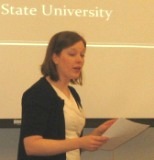 |
Section F.--Three Chapters (Click
on the chapter names or scroll down.)
WRITING FOR
MAJOR & PROFESSION
Writing in Majors, Disciplines, and Professions;
Multimodal Design;
and Applying for Work
Visual
& Multimodal Design:
Using Space, Graphics, and Multimodal Typing and
Methods
-
Writing
in Majors,
Disciplines,
Professions: Writing in the
Professions, Disciplines, and Majors--Instructions and Sample Papers
See also "Ch. 12:
Basic Types of College
Papers--Directions & Samples"
for methods and sample papers across multiple disciplines,
Applying for Jobs, College, or Graduate
School: Resumes, Application and Cover Letters, Personal Statements, etc.
|
|
 |
Chapter
19:
VISUAL & MULTIMODAL
DESIGN
Using Space, Graphics, and Multimodal Typing
and Methods
(rev. 4-13) |
|
General/Intro:
Video:
-
Digital rhetoric,
what is it:
U.
Cal. Irvine (slide show),
U. Cal. Irvine (class, 2:22),
Texas ("Introduction," 9:40),
Visual Argument (useful, humorous intro,
9:25)
-
Digital rhetoric,
examples on YouTube:
McDonald's and Image (6:38),
"Visual Rhetoric Mini Documentary" (3:50)
-
Multimodal writing,
what is it:
MLA Workshop (2:16)
-
Multimodal
portfolio, example:
Cal St. Chico (9:28)
-
Multimodal video,
comparison-contrast essay example:
Arkansas (10:50)
-
PowerPoint:
Pennsylvania (9 tutorials, slides w/audio,
1:26-15:24)
Specific Info:
(Sites with samples or examples are in
BOLD.)
Guerilla Grammar:
Ask a specific question or type a subject at
Ask.com,
Bing, Dogpile,
Google, or Wikipedia.
How to Search
Return to top.
|
|
 |
Chapter 20:
WRITING IN MANY FIELDS &
DISCIPLINES
Writing in the Professions, Majors, and
Disciplines--Instructions and Sample Papers
(rev. 6-12) |
|
General/Intro:
Video, Audio, Slides:
-
ABSTRACT for
social science (APA) majors and grad students
Maryland (6:50)
-
Annenberg Learner News
Writing:
15 half-hr. video lessons
-
BUSINESS & PROFESSIONAL: See
Purdue
(several on report writing, slides & audio)
-
CONFERENCE PAPER, giving a:
Claremont (graduate-level slides)
-
EMAIL:
W. Virginia
(professional, w/attachments, slides & audio, 2:25)
-
ENGINEERING:
Colorado St.,
Purdue
(several on report writing, slides & audio),
Texas A&M (interview, 9:28)
-
LITERATURE REVIEW for majors and
grad students, multiple disciplines:
Maryland, Part I (intro to basics, 5:22),
Maryland, Part II (intro to organizing, 7:40),
Massey (major lecture,
25:06),
Texas A&M (major
lecture, 46:07)
-
MEMO, slides & audio:
Purdue 1
(slides & audio, 4:01),
Purdue 2
(4:22)
Purdue 3 (4:52)
-
MUSIC:
Claremont (slides)
-
NEWS WRITING, 15 half-hr. audios:
Shasta/Annenberg/KHSL-TV
-
RHETORIC, intro to:
Purdue
(def. & history, slides and audio, 3:27)
Info for Writing in Many Disciplines:
(Sites with samples or examples are in
BOLD.)
WARNING:
Please do NOT copy--without giving credit--even
one phrase or sentence of samples/examples. Doing so is called
"plagiarism," one of the greatest of academic sins. Are teachers able to
identify plagiarized papers easily?
Yes! To see why, click on "Yes!"
or see "Plagiarism in "Chapter
16."
However, you may mimic the academic or professional style, tone, or voice
of these papers, if you wish. Doing so is not plagiarism but rather
experimentation and practice. (You may also quote or paraphrase
portions of these papers if you give proper credit in the text and in your
bibliography.)
-
ABSTRACT:
Colorado St.,
Illinois
(brief),
Princeton-Wash.,
Rensselaer,
RILM,
St. Cloud
-
ACADEMIC PROPOSAL:
Toronto
-
ANNOTATED BIBLIOGRAPHY:
Cornell,
Memorial,
St. Cloud,
Toronto,
Wisconsin
-
APPLICATION (JOB) MATERIALS: See below, "Ch. 21.
Applying to Jobs, College, and Graduate
Schools."
-
ARTICLE, how to:
DePaul 1
(mgzn.),
DePaul 2 (nwspr.),
Writing for College 1
(chapter on news art.),
Writing for College 2
(chapter on mgzn. art.)
-
BUSINESS WRITING:
Colorado St.,
Purdue,
EnglishGrammar.com (editing
errors),
N. Carolina
(letters),
Rensselaer (Memo),
Claremont
(advanced),
Colorado St. (business email
letters),
Colorado St.
(Executive Summary),
Gallaudet
(letters),
IO Data Centers
(case studies samples),
PrismNet (technical writing)
-
BUSINESS WRITING FOR ACADEMIC PURPOSES:
Claremont,
DePaul (intro)
-
DISSERTATION: See "Thesis, senior-graduate" below.
-
EMAIL:
Colorado St. 1
(general),
Colorado St. 2
(business email letters & etiquette),
Purdue (etiquette)
-
POLICY
MEMO:
Duke
-
POSTER
PRESENTATION:
Colorado St.,
Duke
(science)
-
PROPOSAL:
Duke
(research & grant w/list of addtnl. resources),
Illinois (intro to
business/technical),
Penn St.
(advncd. research & grant proposal),
Toronto (brief intro to acad.
prop.)
-
RESEARCH using human subjects:
Colorado St.
-
RESEARCH writing in humanities, social sciences, history, & sciences:
Research and Documentation
-
REVIEW
of resources/literature in most disciplines:
Wisconsin
-
STATISTICS:
Colorado St.
-
SUMMARY:
Illinois,
Colorado St.,
Santa Rosa
(intro)
-
SURVEYS:
Colorado St.
-
TECHNICAL WRITING:
OnlineEnglishDegree (brief intros
to types)
-
THESIS,
senior-graduate; DOCTORAL DISSERTATION:
Claremont 1
(steps of),
Claremont 2
(See "Web Sources"),
DART Europe (master's,
doctoral),
Harvard (undergraduate senior
theses in bottom of list "DISCIPLINARY WRITING GUIDES"),
Networked Digital Library
(master's, doctoral),
Penn St.
(proposals for)
-
WEB
WRITING:
Bedford Researcher,
Colorado St.
Info for a Specific Discipline:
(Sites with samples or examples are in
BOLD.)
-
ANTHROPOLOGY: See below, "Social Anthropology."
-
ART
HISTORY:
Harvard (hndbk.),
Dartmouth
(intro),
Duke
(visual analysis),
Hamilton,
North Carolina,
Skidmore
-
ARTIST
STATEMENT:
Claremont
-
BIOLOGY:
Dartmouth
(intro). See also "Sciences" below.
-
BUSINESS:
See "Business" above.
-
CASE
STUDY:
Colorado St.
-
CHEMISTRY:
Dartmouth
(intro). See also "Sciences" below.
-
COMMUNICATION STUDIES:
North Carolina
-
CREATIVE
WRITING:
About.com (revising fiction),
Allen Ginsberg (revising poetry),
Duke
(general brief intro),
Purdue 1
(creative nonfiction),
Purdue 2
(poetry),
South Florida
(elements of fiction)
-
CRIMINAL
JUSTICE: See
Minn. St. Mankato.
-
CRITICAL
REVIEW: See "Critical review" in "Ch. 12.
Basic Types of College
Papers--Directions & Samples."
-
DRAMA:
North Carolina
-
EAST
ASIAN STUDIES:
Harvard
-
ECONOMICS: See
Minn. St. Mankato.
-
EDUCATION: See
Minn. St. Mankato.
-
ENGINEERING:
Brown (general handbook),
Colorado St. 1
(intro, civil),
Colorado St. 2
(intro, electrical),
Colorado St. 3
(intro, mechanical),
Rensselaer
(electrical--proposal, progress report, final report, lab report)
-
ENGLISH:
See "Ch. 4.
Literature, Reading It and Writing."
-
ETHNOGRAPHY:
Colorado St.,
Duke
(brief intro)
-
FILM:
Dartmouth
(hndbk.),
DuPage
(basic intro),
XTEC (review basics)
-
FOREIGN
LANGUAGE:
Vanderbilt
-
GOVERNMENT:
Cornell U.
(theory),
DePaul
(gnrl. intro),
Duke (intro to policy memo),
Harvard 1 (intro hndbk.),
Harvard 2 (sr. thesis hndbk.),
N. Carolina
(pol. sci.),
N. Illinois
(brief intros to pol. sci.)
-
HEALTH
SCIENCES:
Purdue (medical journalism),
Toronto (hndbk.)
-
HISTORY:
Bowdoin
(hndbk.),
Brown,
DePaul
(gnrl. intro),
Hamilton
(pblms. to avoid),
Harvard 1 (intro),
Harvard 2 (sr. thesis),
Harvard 3 (history & sr.
thesis),
Dartmouth
(intro),
Toronto
(intro),
Washington
(6 guides). Additional links:
Claremont
-
HUMANITIES:
Dartmouth
(brief intro)
-
JOURNALISM:
DePaul
(gnrl. intro),
George Washington
(gnrl. intro),
Purdue (5 short intros),
Seton Hill (hard news).
Also see "Article" above.
-
LAB
REPORT: See below, "Sciences."
-
LEGAL
WRITING:
Write Better English
(variety of links)
-
LITERATURE, ENGLISH: See "Ch. 4.
Writing about & Reading
Literature"
-
MATHEMATICS:
Hamilton
(proofs). Also see
Minn. St. Mankato.
-
MEDICAL:
See "Health."
-
MUSIC:
Harvard,
Dartmouth
(intro),
George Washington
-
NURSING:
See
Minn. St. Mankato.
-
PHILOSOPHY:
Arizona St.
(chapter w/adtnl. links),
DePaul
(brief, adtnl. links),
Harvard 1
(intro),
Harvard 2
(hndbk.),
North Carolina
(briefer intro),
Online Pprs. in Phil.
(100s),
-
PHYSICS:
See
Minn. St. Mankato.
-
POLITICS,
POLITICAL SCIENCE: See "Government" above.
-
PSYCHOLOGY:
Allegheny
(intro),
DePaul
(intro),
Harvard 1
(intro),
Harvard 2 (majors hndbk.)
-
RELIGION:
Harvard (hndbk.),
Claremont
(advncd. intro),
Dartmouth
(intro),
N. Carolina
(general)
-
SCIENCE
A.--science style:
Duke 1
(grad. hndbk. w/adtnl. links),
Duke 2
(concise, clear cohesion, 61 slides)
-
SCIENCE B.--lab/IMRaD report:
Columbia (IMRaD, Eng. & Russian),
Dartmouth
(chemistry lab notebook),
Duke (brief IMRaD intro),
Hamilton
(biology IMRad lab rprt. w/research & charts),
N. Carolina 1 (interactive lab
report self-help),
N. Carolina 2
(lab reports),
Rensselaer (IMRaD brief intro to lab
report),
Toronto
(IMRaD lab report, longer gen. intro),
Wisconsin 1 (IMRaD intro),
Wisconsin 2 (sample)
-
SCIENCE
C.--general/misc.:
American Scientist
(longer adv. intro),
Arizona
("How to Read..."),
Colorado St.,
Dartmouth (brief intro),
Duke 1
(article review),
Duke 2
(brief intro to wrtng. for popular audience),
Duke 3
(poster prsntn.),
Harvard (hndbk.),
Illinois (intro),
Ohio State
(physics abstracts),
Toronto (general intro),
Toronto (longer intro for physics),
-
SOCIAL
ANTHROPOLOGY:
Harvard (hndbk.),
North Carolina (intro)
-
SOCIOLOGY/SOCIAL SCIENCES:
Hamilton
(APA ppr. w/notes),
Harvard (sr. thesis hndbk.),
N. Carolina
(general),
Dartmouth 1 (intro),
Dartmouth 2
(details)
-
SPEECH:
See, above, "Communication studies."
-
TECHNICAL
WRITING:
PrismNet,
OnlineEnglishDegree (intros), Tameri
-
WOMEN,
GENDER, & SEXUALITY:
Harvard (sr. thesis hndbk.)
Guerilla Grammar:
Ask a specific question or type a subject at
Ask.com,
Bing, Dogpile,
Google, or Wikipedia.
How to Search
Return to top.
|
|
 |
Chapter 21:
APPLYING FOR JOBS,
COLLEGE, OR GRADUATE SCHOOL
Resumes, Application and Cover Letters,
Personal Statements, etc.
(rev. 6-12) |
|
Note:
The following sites provide
written guidelines to help you develop your resume or curriculum vita, write a
cover letter, create a personal statement for graduate school, etc.
(Sites with samples or examples are in
BOLD.)
General/Intro:
Video:
-
Cover or application letter, slides & audio:
Purdue
(slides & audio, 11:41)
-
Personal statement:
Purdue (slides &
audio, 12:55), W. Virginia
(intro, audio, 5:27)
-
Resume:
Purdue
(intro, slides & audio, 5:40),
S. Cal.
(31:44)
Business school application--learn how to navigate
typical application processes for graduate business programs:
Wisconsin
(23 min.)
Specific Info:
Applying for College Teaching:
Jewell
Cover letter:
California S.F.,
Coll. Art Assoc. (art hist.),
Dartmouth,
Illinois (brief intro),
Rensselaer,
www.HowToPersonalStatement.com.
Curriculum Vita (see also, below, "Resume"):
California S.F.,
Emory,
Colorado St.,
Science
Graduate school app.: See "Admission" and "Cover
letter" above.
Personal Statement:
www.HowToPersonalStatement.com.
Also see "Admission" and "Cover
letter" above.
Resume (see also, above, "Curriculum Vita"):
Cengage,
Colorado St.,
Dartmouth,
eResumeWriting (brief, simple
intro),
JobStar
(basic intros),
Pennsylvania,
Rensselaer
Guerilla Grammar:
Ask a specific question or type a subject at
Ask.com,
Bing, Dogpile,
Google, or Wikipedia.
How to Search
Return to top.
|
-----
Longhand.jpg)
|
|